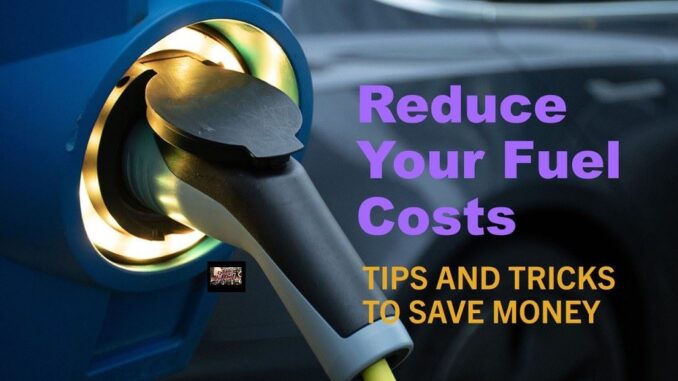
Reducing fuel cost, is actually quite easy, if you can follow a short list of rules.
So, doing one thing differently may not show, any rewards in the beginning.
But, as you keep adding the small things, they begin to add up. And, before you know it, excessive fuel consumption, becomes a thing of the past.
Reducing fuel cost is actually quite easy. Excessive fuel consumption, can also be an sign of a much more serious issue. And, if left ignored, can develop into an expensive repair.
Did you know that your car can burn, up to 30 per cent more fuel, if proper maintenance is not performed, on a regular schedule?
So, familiarizing yourself with the more common causes, will keep your car running, as economically and efficiently as possible. We all know the importance of regular car maintenance, but for many reasons, we just don’t do it often enough.
Cars use the most fuel during initial acceleration. So, if your trip is short or includes a lot of stops, then you will use more fuel. In addition, aggressive driving where you accelerate hard and brake late, causes you to flood the engine with extra fuel.
Over 75 percent of the following list is part of, regular car maintenance.
A Few Rules To Follow:
Engine Oil
Engine oil is used to lubricate the insides of your engine. Above all, to prevent, abnormal wear and tear. So, doing oil changes at the proper time is great. But, you actually have to use the correct oil. All engines don’t take the same oil. That’s why you should always follow your, owners manual.
Without regular oil changes, friction builds up, between the engine’s many moving parts. Excessive friction forces the engine to work harder than it should. As a result, creating excess heat and pressure on the entire engine. And, when your oil level gets too low, or becomes dirty, it can’t perform as it should. So, change your oil, because your engine will last longer, while reducing fuel cost.
Poor Quality Fuel
You should always be careful about, what goes into your engine. A poor quality fuel can severely affect your engine’s efficiency, and its life. Poor quality fuel will wear out injectors and pumps prematurely, and reduce overall engine reliability.
There are many additives available out there that make your engine run better, with the same fuel. But, be careful while selecting any additive for your engine. Because, a wrong or duplicate additive can ultimately do more harm than good. A good fuel additive cleans the intake valves and injectors, to help reduce the accumulation of carbon deposits.
Spark Plugs
Replacing worn out spark plugs with new ones, effectively restores the ignition system’s efficiency. Misfires are reduced, power is restored, economy of operation is enhanced, and emissions are reduced. Spark plug health, on today’s engines is very important, and if ignored, can cause serious problems. So, it stands to reason that, weak or bad spark plugs, are a big cause of concern.
Spark plug health today, is mostly overlooked, because of long life spark plugs. But, there is a risk, if the spark plugs are ignored, for too long. Firstly, keeping track of your spark plug health, is easier than you think. And, if you do need to replace them, you’ll see an apparent difference, in your engines performance. The engine will run smoother and faster, and the car will have better acceleration. Furthermore, you will also notice an improvement in, fuel economy.
Use the manufacturer’s recommendation for your car, as this particular service varies from brand to brand and model to model.
Tires
A big help in reducing fuel cost is to check your tire pressure regularly. Your tire pressure has an important impact on your fuel consumption, regardless of the brand of tires. When a tire is under-inflated, it presses down, and creates a larger point of contact with the road. This in turn increases the rolling resistance, which makes the car use more fuel.
This increase can be up to 2% per under-inflated tire, which cannot be overlooked seeing as fuel prices are so high.
So, check your tire pressure regularly, especially during the winter. Cold temperatures tend to reduce tire pressure. It is suggested to have your tire pressure checked, once a month in the summer. And, even more often, during the winter.
Cooling System
The first benefit of a engine coolant flush is that it can help keep, your engine running smoothly. Over time, the chemicals in engine coolant can become degraded, and cause deposits to build up on internal parts. This can lead to clogged passages, decreased cooling efficiency, and even reduced performance. By flushing the coolant, you can get rid of these deposits, and keep your engine running at peak efficiency.
Another benefit of a coolant flush is that it can help improve fuel efficiency. When the coolant becomes contaminated, it can cause the engine to run hotter than normal. This means that more fuel is being burned, in order to maintain the desired temperature. All leading to, lower fuel economy. By flushing the coolant, you can make sure that your engine is running at its most efficient temperature. And, this helps in reducing fuel cost.
Air Filter
There are many reasons to have a clean air filter, but one big reason is to have good fuel economy. So, if your air filter is clogged or dirty. Then, less air makes its way into the combustion chamber. Consequently, making the engine work a lot harder, to satisfy the power requirements of the driver.
This may even cause a running rich condition, where the air/fuel mixture is not optimal. So, remember to change your air filter at the suggested interval, set by the car manufacturer. Your service manual will have this information.
NOTE: The importance of regular car maintenance is clear. Because, what you read above, is all part of it.
What Can Stop You From, Reducing Fuel Cost:
- Sluggish Oxygen (O2) Sensors
- Inaccurate or Defective Coolant Temperature Sensor (CTS)
- Defective Engine Thermostat
- Engine Misfires
- Intake Manifold or (EGR) Valve Leak
- Worn or Fouled Spark Plugs
- Dirty Fuel Injectors
- Low Compression
- Wrong Oil Viscosity
- Dirty Air Filter
- Clogged Converter or Exhaust Restriction
- Slipping Clutch or Transmission
- Low Tire Pressure
- Dragging Brakes
- Too Much Weight in Your Trunk
- Poor Driving Habits
With no estimated date, when prices will come down, consumers need to be smart about, how to save on fuel. Fortunately, there are many ways to save significantly, without needing a great deal of effort on your part.
Rules To, Improve Your Driving Habits, To Help With Reducing Fuel Consumption:
- Avoid quick or ‘jackrabbit” starts and stops.
- Aggressive driving, wastes fuel.
- Observe the speed limit. Fuel mileage decreases rapidly, above 60 miles per hour.
- Avoid excessive idling. Idling gets 0 miles per gallon.
- Use cruise control, because it helps you maintain a constant speed limit.
- Use overdrive gears, because the engine speed goes down, saving fuel and reducing engine wear.
- Avoid carrying unused heavy items in your trunk.
- Use air vents to circulate air, instead of air conditioning.
Conclusion
So, most of these rules will give you a very slight increase in, reducing fuel cost. But, use several together and the fuel mileage improvements, will really add up.
BY DANNY BENDER




